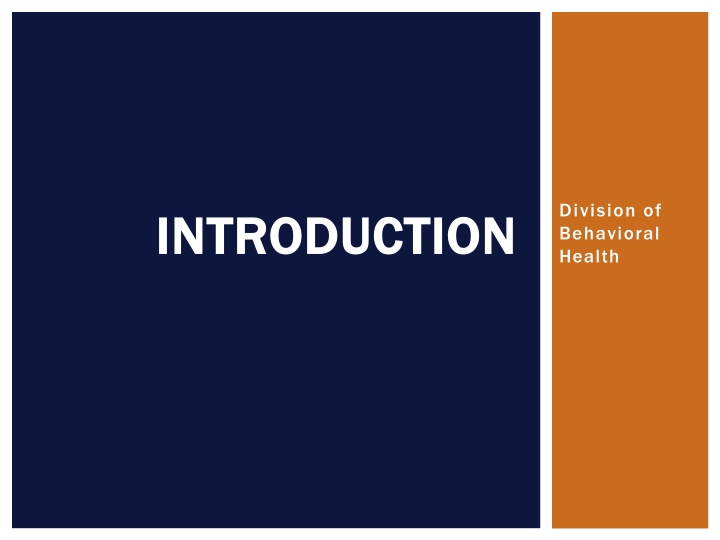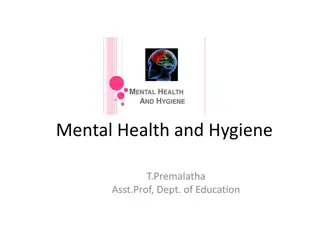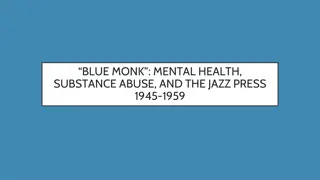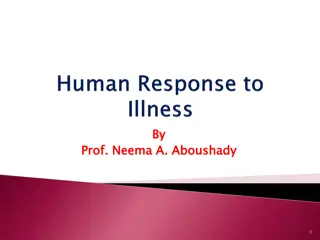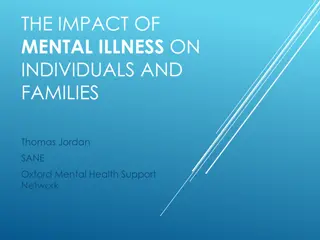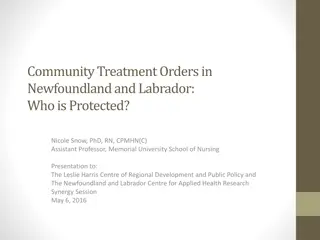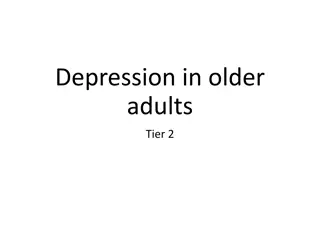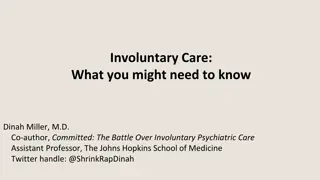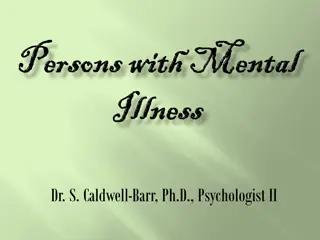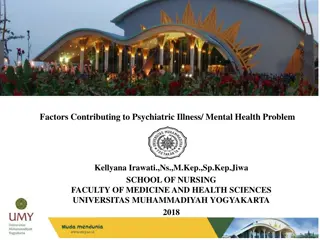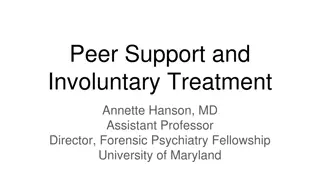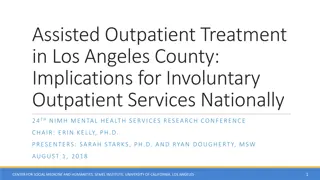Involuntary Commitment Criteria for Adults with Serious Mental Illness
Involuntary commitment for adults with serious mental illness is a sensitive issue that involves specific criteria to determine if someone poses a danger to themselves or others. The criteria include having a serious mental illness, being a threat to self or others, or having an inability to provide for basic needs. This process is crucial for ensuring individuals receive the necessary treatment they need for their well-being and safety.
Download Presentation

Please find below an Image/Link to download the presentation.
The content on the website is provided AS IS for your information and personal use only. It may not be sold, licensed, or shared on other websites without obtaining consent from the author.If you encounter any issues during the download, it is possible that the publisher has removed the file from their server.
You are allowed to download the files provided on this website for personal or commercial use, subject to the condition that they are used lawfully. All files are the property of their respective owners.
The content on the website is provided AS IS for your information and personal use only. It may not be sold, licensed, or shared on other websites without obtaining consent from the author.
E N D
Presentation Transcript
Division of Behavioral Health INTRODUCTION INTRODUCTION
INVOLUNTARY INVOLUNTARY COMMITMENT COMMITMENT OF ADULTS OF ADULTS Module 3 Module 3
INVOLUNTARY COMMITMENT INVOLUNTARY COMMITMENT CRITERIA FOR ADULTS CRITERIA FOR ADULTS A person 18 years or older is subject to involuntary commitment if: The person has a serious mental illness Due to the serious mental illness, the person is a danger to self or others or has a chronic disability The person needs and is likely to benefit from treatment. SDCL 27A-1-2
SERIOUS MENTAL ILLNESS SERIOUS MENTAL ILLNESS Serious Mental Illness is a substantial organic or psychiatric disorder of thought, mood, perception, orientation or memory which significantly impairs judgment, behavior or ability to cope with the basic demands of life. Intellectual disabilities, epilepsy, other developmental disabilities, alcohol or substance abuse, or brief periods of intoxication, or criminal behavior do not, alone, constitute serious mental illness.
DANGER TO SELF DANGER TO SELF Danger to self is a reasonable expectation that a person will inflict serious physical injury upon him or herself in the near future, due to a serious mental illness, as evidenced by: The person s treatment history and recent acts or omissions which constitute a danger of suicide or self-inflicted serious physical injury; (i.e. physical harm to self) o Such acts may include a recently expressed threat if the threat is such that, if considered in the light of its context or in light of the person s recent previous acts or omissions, it is substantially supportive of an expectation that the threat will be carried out. A reasonable expectation of danger of serious personal harm in the near future, due to a serious mental illness, as evidenced by the person s treatment history and the person s recent acts or omissions which demonstrate an inability to provide for some basic human needs such as food, clothing, shelter, essential medical care or personal safety, or by arrests for criminal behavior which occur as a result of the worsening of the person s serious mental illness; (i.e. inability to care for self). SDCL 27A-1-1(7)
DANGER TO OTHERS DANGER TO OTHERS Danger to others is a reasonable expectation that a person will inflict serious physical injury upon another person in the near future due to serious mental illness, as evidenced by: The person s treatment history and recent acts or omissions which constitute a danger of serious physical injury for another individual o Such acts may include a recently expressed threat if the threat is such that, if considered in light of its context or in light of the person s recent previous acts or omissions, it is substantially supportive of an expectation that the threat will be carried out. 27A-1-1(6)
CHRONIC DISABILITY CHRONIC DISABILITY Chronic disability is a condition evidenced by a reasonable expectation, based on the person's psychiatric history that the person is incapable of making an informed medical decision because of a serious mental illness is unlikely to comply with treatment as shown by a failure to comply with a prescribed course of treatment outside of an inpatient setting on two or more occasions within any continuous twelve month period, and, as a consequence, the person's current condition is likely to deteriorate until it is probable that the person will be a danger to self or others SDCL 27A-1-1(4)
TYPES OF INVOLUNTARY COMMITMENTS TYPES OF INVOLUNTARY COMMITMENTS There are three ways that an adult can be involuntarily committed: 1. QMHP Hold 2. By Petition 3. Law Enforcement Hold
#1 QMHP HOLD #1 QMHP HOLD If an individual presents to a facility licensed by the state as a hospital and, after an examination by a QMHP, it is determined that the individual is seriously mentally ill and in such condition that immediate intervention is necessary to protect the individual from physical harm to self or others, the QMHP may initiate a 24 hour hold on the individual and retain the individual at the hospital for purposes of observation and emergency treatment. Notifying the Chair Notifying the Chair The hospital or the QMHP shall notify the Chair of the County Board of Mental Illness of the 24 hour hold Completing the Petition Completing the Petition The QMHP completing the petition must have personal knowledge of the individual s behaviors The QMHP must advise the individual of their rights in both written and verbal form Filing The QMHP must advise the individual of their rights in both written and verbal form Filing the Petition the Petition The QMHP must file a petition with the County Board of Mental Illness within 24 hours after the individual is placed on the hold or the individual must be released Based on both the petition and the QMHP examination, the Board will make a determination on Based on both the petition and the QMHP examination, the Board will make a determination on whether to release the individual or hold them until a hearing can be held. whether to release the individual or hold them until a hearing can be held. SDCL 27A-10-19
#2 BY PETITION #2 BY PETITION Commitment by Petition follows the process below: Individual (family member or medical personnel) completing petition Individual (family member or medical personnel) completing petition: Any person, 18 years of age or older, may complete a petition stating the factual basis for concluding that the individual is seriously mentally ill and in such condition that immediate intervention is necessary to protect the individual from physical harm to self or others The person completing the petition must have personal knowledge of the individual s behaviors The petition is submitted to the County Board of Mental Illness County Board of Mental Illness County Board of Mental Illness Based on the petition, the County Board of Mental Illness makes a determination on whether to issue an emergency warrant for the individual to be taken into custody Law Enforcement Law Enforcement If a warrant is issued, law enforcement will take the individual into custody, and advise them of their rights in both written and verbal form The individual is taken to an appropriate regional facility QMHP QMHP A QMHP examination is completed within 24 hours and the results of the examination are reported to the County Board of Mental Illness Based Based on make make a a determination determination on on both both the the petition petition and on whether and the whether to to release the QMHP QMHP examination, examination, the release the the individual the County County Board hold them them until Board of of Mental until a a hearing hearing can Mental Illness can be SDCL 27A-10-1 Illness will be held will individual or or hold held
#3 LAW ENFORCEMENT HOLD #3 LAW ENFORCEMENT HOLD Law enforcement may place an individual on a 24 hour hold if there is probable cause to believe that the individual is seriously mentally ill and in such condition that immediate intervention is necessary to protect the individual from physical harm to self or others. Law Enforcement Law Enforcement The law enforcement officer completing the petition must have personal knowledge of the individual s behaviors A petition must be filed with the County Board of Mental Illness within 24 hours after the individual is taken into custody or the individual must be released If placed on a hold, the individual is advised of their rights in both written and verbal form and transported to an appropriate regional facility QMHP QMHP A QMHP examination must be completed within 24 hours after the individual is taken into custody Based on both the petition and the QMHP examination, the County Board of Mental Illness will make a determination on whether to release the individual or hold them until a hearing can be held. SDCL 27A-10-3
NOTICE OF RIGHTS NOTICE OF RIGHTS Immediately after an individual is taken into custody, she/he must be notified both orally and in writing of the following rights: The right to immediately contact a person of their choice The right to immediately contact and be represented by an attorney That the individual will be examined by a qualified mental health professional, designated by the Chair of the County Board of Mental Illness, within 24 hours of being taken into custody to determine whether custody should be continued The right, if custody is continued, to an independent examination That should custody be continued, the right to a hearing within 5 to 7 days, depending on if there are weekends and/or holidays Post-Commitment Treatment o The cost of any post-commitment treatment, medication and any hearing relating to medication, any post-commitment proceedings, including habeas corpus, any additional examinations requested by the individual, and costs of court-appointed counsel are the individual s responsibility and a lien may be filed upon the individual s real and personal property to ensure payment. SDCL 27A-10-5
MOBILE CRISIS TEAM MOBILE CRISIS TEAM A Mobile Crisis Team is an interdisciplinary team of one or more mental health professionals able to respond to any person in the community, usually visiting the person at home, for mental health and chemical dependency/abuse intervention can be used as an alternative to apprehension of an individual and transfer to an appropriate regional facility SDCL 27A-10-21
MOBILE CRISIS TEAM MOBILE CRISIS TEAM (CONTINUED) (CONTINUED) Mobile crisis teams and crisis intervention team certified law enforcement officers are able to resolve crisis events at the clinic or hospital or other location instead of solely at the individual s home. A crisis intervention team certified law enforcement officer is any law enforcement officer who has undergone a comprehensive training program in crisis intervention techniques involving any person who is mentally ill or has substance abuse issues and has received certification as a crisis intervention officer by the officer's department. If any member of the mobile crisis team or the crisis intervention team certified law enforcement officer accepts direct supervision of the individual, in writing, the member or officer may: o Resolve the intervention on a voluntary basis, at the clinic or hospital, at the individual's home or other location or with the assistance of any public or private community service that the patient is willing to accept. Any team member may request the assistance of law enforcement for the voluntary transfer of the individual. o Direct the law enforcement officer to proceed with the apprehension of the individual and transport the individual to either: An appropriate regional facility for an emergency intervention and a mental illness examination (SDCL 27A-10-6) An approved treatment facility offering detoxification services for chemical dependency emergencies (SDCL 34-20A-55 and 34-20A-56)
INVOLUNTARY INVOLUNTARY COMMITMENT OF COMMITMENT OF Module 4 Module 4 MINORS MINORS
INVOLUNTARY COMMITMENT CRITERIA INVOLUNTARY COMMITMENT CRITERIA FOR MINORS FOR MINORS The involuntary commitment process used for minors is similar to the process for adults: Minors can be involuntarily committed by a (#1) QMHP hold, (#2) by petition, or by (#3) a law enforcement hold The County Board of Mental Illness handles juvenile involuntary commitments A minor is entitled to a QMHP examination within 24 hours of the minor being held/taken into custody A petition needs to be filed with the County Board of Mental Illness within 24 hours of the minor being held/taken into custody or the minor will be released Based on both the petition and the QMHP examination, the County Board of Mental Illness will make a determination on whether to release the minor or hold them until a hearing can be held
INVOLUNTARY COMMITMENT CRITERIA INVOLUNTARY COMMITMENT CRITERIA FOR FOR M I N O R S ( C O N T I N U E D ) M I N O R S ( C O N T I N U E D ) A minor is subject to involuntary commitment if: The minor displays one or more of the following conditions: Exhibits: Exhibits: Seriously impaired contact with reality Severely impaired social, academic, and self-care functioning Thinking is frequently confused Behavior may be grossly inappropriate and bizarre Emotional reactions are frequently inappropriate at the situation Manifests long Manifests long- -term behavior problems or suicidal behavior; or term behavior problems or suicidal behavior; or Suffers from severe anxiety, depression, irrational fears, and concerns Suffers from severe anxiety, depression, irrational fears, and concerns Symptoms may be exhibited as Serious eating and sleeping disturbances Extreme sadness of suicidal proportion Maladaptive dependence on parents Avoidance of non-familial social contact
INVOLUNTARY COMMITMENT CRITERIA INVOLUNTARY COMMITMENT CRITERIA FOR FOR M I N O R S ( C O N T I N U E D ) M I N O R S ( C O N T I N U E D ) As a result of being an individual with a serious emotional disturbance, the minor is a danger to self or others. This includes the minor s ability to attend to their basic human needs based upon what is appropriate for the age of the minor o The minor needs and is likely to benefit from treatment o Delinquent behavior alone does not constitute a serious emotional disturbance.
SERIOUS EMOTIONAL DISTURBANCE SERIOUS EMOTIONAL DISTURBANCE An individual with a serious emotional disturbance is an individual who: Is under eighteen years of age Exhibits behavior resulting in functional impairment which substantially interferes with, or limits the individual's role or functioning in the community, school, family, or peer group Has a mental disorder diagnosed under the Diagnostic and Statistical Manual of Mental Disorders, fourth edition revised (DSM IV-TR), 1994*; Has demonstrated a need for one or more special care services, in addition to mental health Has problems with a demonstrated or expected longevity of at least one year or has an impairment of short duration and high severity. Intellectual disabilities, epilepsy, other developmental disabilities, alcohol or substance abuse, brief period of intoxication, or criminal or delinquent behavior do not, alone, constitute serious emotional disturbance do not, alone, constitute serious emotional disturbance. SDCL 27A-15-1.1 *The statutory language has not been updated since the release of the DSM 5. A mental disorder diagnosed under the DSM 5 would be acceptable.
NOTICE OF RIGHTS NOTICE OF RIGHTS Immediately after the minor is taken into custody, the minor must be notified both orally and in writing of the following rights: The right to immediately contact a parent, guardian, legal custodian, or other persons of the minor s choosing The right to immediately contact and be represented by counsel That the minor will be examined by a QMHP, designated by the chair of the County Board of Mental Illness, within 24 hours after being taken into custody to determine whether custody should continue The right, if custody is continued, to an independent examination That should custody be continued, the right to a hearing within 5 to 7 days, depending on if there are weekends and/or holidays That the referring county shall pay any expenses incurred by the board holding the hearing, including the transportation of the minor to the hearing, subject to reimbursement by the county ultimately proven to be the county of residence No lien may be placed against the minor for the expenses incurred by the board holding the hearing, including the transportation of the person to the hearing Post-Commitment Treatment The cost of any post-commitment treatment, medication and any hearing relating to medication, any post-commitment proceedings, including habeas corpus, any additional examinations requested by the individual, and costs of court- appointed counsel are the individual s responsibility and a lien may be filed upon the individual s real and personal property to ensure payment.
APPROPRIATE REGIONAL FACILITY APPROPRIATE REGIONAL FACILITY A juvenile detention facility may be used for pre-hearing custody of a minor if the availability of other appropriate regional facilities have been explored and exhausted. A minor cannot, under any circumstances, A minor cannot, under any circumstances, be held in a jail. be held in a jail. If an appropriate regional facility maintains a separate unit for minors, a minor cannot be confined with adult detainees or patients. A minor can only be detained at a regional facility without a separate unit for minors if all other options were explored and exhausted. If placed in a facility with adults, the minor should be given separate sleeping quarters and day areas to the maximum extent possible. SDCL 27A-15-31
PETITION FOR PETITION FOR COMMITMENT COMMITMENT Module 5 Module 5
PETITION FOR COMMITMENT PETITION FOR COMMITMENT Who Can Petition? Any person eighteen years of age or older who has personal knowledge of the individual s behavior may file a petition with the County Board of Mental Illness alleging that the subject is seriously mentally ill (or has a serious emotional disturbance for minors) and in such condition that immediate intervention is necessary for the protection from physical harm of him/herself or others. Note: The same QMHP cannot initiate the petition and perform the QMHP examination.
INFORMATION NEEDED ON AN INFORMATION NEEDED ON AN ADULT PETITION ADULT PETITION The petition must be on a form, verified by affidavit, and must include: 1. A statement by the petitioner that the petitioner believes, on the basis of personal knowledge, that the individual is, as a result of serious mental illness, a danger to self or others; 2. The specific nature of the danger; 3. A summary of information upon which the statement of danger is based; 4. A statement of facts which caused the subject to come to the petitioner s attention; 5. The address and signature of the petitioner; 6. A statement of the petitioner s interest in the case; and 7. The name, address, age, marital status, and occupation of the individual to be evaluated. SDCL 27A-10-1
INFORMATION NEEDED ON A INFORMATION NEEDED ON A MINOR PETITION MINOR PETITION The petition must be on a form, verified by affidavit, and must include: 1. A statement by the petitioner, on the basis of personal knowledge, that such minor is, as a result of a serious emotional disturbance, a danger to self or others; 2. The specific nature of the danger; 3. A summary of the information upon which the statement of danger is based; 4. A statement of facts which caused the minor to come to the petitioner's attention; 5. The name, address, and signature of the petitioner; 6. A statement of the petitioner's interest in the case; and 7. The name of the minor to be evaluated and the address and age of the minor and the name and address of the minor's parents, guardian, or nearest relative. SDCL 27A-15-30
PETITION FOR COMMITMENT PETITION FOR COMMITMENT The State's Attorney or other person designated by the Board of County Commissioners shall assist the petitioner in completing the petition. (Note that the States Attorney will not likely have personal knowledge as required by 27A-10-1 and / or 27A-15-10. Assistance is provided by training, and advice and direction in the use of the forms and the process.) Each county will likely have a different format for their petition. Please consult with your local Chair of the County Board of Mental Illness or your local State s Attorney for the petition used in your area. Upon completion of the petition, the petition shall be forthwith submitted to the Chair of the County Board of Mental Illness where such seriously mentally ill person is found. The term, forthwith, means that the petition shall be completed and submitted to the chair at the earliest possible time during normal waking hours. The term, forthwith, means that the petition shall be completed and submitted to the chair at the earliest possible time during normal waking hours. If a petition is not filed with the chair within 24 hours of the apprehension of the person, the person shall be released.
PETITION EXAMPLES PETITION EXAMPLES Example petitions may be found at: http://dss.sd.gov/behavioralhealth/community/countyboard.aspx Please check with your Chair of the County Board of Mental Illness or your local State s Attorney for the petition used in your area.
COUNTY BOARD OF COUNTY BOARD OF MENTAL ILLNESS MENTAL ILLNESS Module 6 Module 6
POWERS OF THE BOARD POWERS OF THE BOARD The County Board of Mental Illness has jurisdiction over all applications or petitions for involuntary commitment the treatment of any involuntarily committed person the safekeeping of any person subject to involuntary commitment within its county. The County Board of Mental Illness may issue subpoenas and compel obedience to any subpoena, and do any act of a court necessary and proper for the purpose of discharging the duties required of it. SDCL 27A-7-4
RELEASE RELEASE If the County Board of Mental Illness determines that the QMHP findings do not support involuntary commitment criteria, the individual must be released.
QUALIFIED MENTAL QUALIFIED MENTAL HEALTH PROFESSIONAL HEALTH PROFESSIONAL (QMHP) EXAMINATION (QMHP) EXAMINATION Module 7 Module 7
QMHP EXAMINATION QMHP EXAMINATION Within 24 hours after an individual is placed on a hold, the individual must be examined by a QMHP designated by the Chair of the County Board Mental Illness serving the area where the individual is being held. The same QMHP cannot initiate the petition and perform the QMHP examination. The QMHP examination shall include a mental status exam. SDCL 27A-10-6
EXAMINATION NOTICE EXAMINATION NOTICE Before the examination, the examiner must: Identify himself/herself to the individual and explain the nature and purpose of the examination Advise the individual that the examination is being performed to assist in the determination of whether custody should continue Further advise the individual that the results of the examination may be used as evidence in an involuntary commitment hearing. SDCL 27A-10-6
CONTENT OF QMHP EXAMINATION CONTENT OF QMHP EXAMINATION (As an Officer, If your wondering what you should be (As an Officer, If your wondering what you should be looking at, consider what the QMHP will be looking for.) looking at, consider what the QMHP will be looking for.) Reason for the evaluation/basis for petition Notice Specific history relevant to allegations (be specific, use quotes, timelines) Brief social history Education Current living situation Vocational/activities of daily living Stress Social support
CONTENT OF QMHP EXAMINATION CONTENT OF QMHP EXAMINATION (CONTINUED) (CONTINUED) Psychiatric history Current/past history Previous commitment/behavior related to the petition Previous suicide threats/attempts History of assaults/harm to others Psychiatric med/treatment response/follow-up with aftercare Substance use history History of legal problems
CONTENT OF QMHP EXAMINATION CONTENT OF QMHP EXAMINATION (CONTINUED) (CONTINUED) Mental Status Examination Level of cooperation Speech Orientation/memory Mood Affect Thought content Delusions Thought processes Insight and judgment Medical Issues that may affect the examination Delirium Acute Intoxication Infection; such as Urinary Tract Infection (UTI) Recent Substance Use When? How much?
COMMUNICATION OF FINDINGS COMMUNICATION OF FINDINGS The examiner must immediately report the findings to the Chair of the County Board of Mental Illness (SDCL 27A-10-6) Results are typically reported to the Chair of the County Board of Mental Illness by phone QMHP or Physician Certificate completed and signed Dictated report
PETITION EXAMPLES PETITION EXAMPLES Example petitions may be found at: http://dss.sd.gov/behavioralhealth/community/countyboard.aspx Please check with your Chair of the County Board of Mental Illness or your local State s Attorney for the petition used in your area. http://unioncountysd.org/states-attorney/resource-page/ [Word and PDF Forms and This Power Point Presentation]
LIABILITY FOR QMHP LIABILITY FOR QMHP Any person serving as the QMHP as designated by the Chair of the County Board of Mental Illness, whose examinations and testimony are conducted in good faith, is immune from any civil liability for such examinations and testimony. The immunity from civil liability under this section does not apply if injury results from gross negligence or willful or wanton misconduct. .
INVOLUNTARY INVOLUNTARY COMMITMENT HEARING COMMITMENT HEARING AND THE BOARD OF AND THE BOARD OF MENTAL ILLNESS MENTAL ILLNESS Module 8 Module 8
THE INVOLUNTARY COMMITMENT THE INVOLUNTARY COMMITMENT HEARING HEARING The involuntary commitment hearing must take place within 5 days of the individual being taken into custody, 6 days if there is a weekend, or 7 days if there is a weekend and a holiday. If a hearing does not occur during this time frame, the individual must be released. The county of residence shall pay any expenses incurred by the board for the hearing or transportation of the individual SDCL 27A-10-8
LOCATION OF THE HEARING LOCATION OF THE HEARING Hearings and review hearings for involuntary commitments shall be conducted in a courtroom of the county courthouse or such other place within the designated county as the Chair of the County Board of Mental Illness may designate with due regard to the rights, safety, and comfort of the person. SDCL 27A-11A-28
HEARINGS HEARINGS The County Board of Mental Illness may exclude any person not necessary for the conduct of the proceedings from the hearings, except any person requested to be present by the proposed patient. All records of the proceedings are confidential and shall be sealed upon such release and shall be opened only by court order of the circuit court.
ATTORNEYS ATTORNEYS Petitioner Petitioner In any proceeding for involuntary commitment, review, or detention, or in any proceeding challenging commitment or detention, the state's attorney for the county in which the proceeding is held shall represent the petitioner and shall defend all challenges to commitment or detention. (SDCL 27A-11A-4) Individual Individual Facing If the alleged mentally ill person has not or cannot employ his own counsel, the Chair of the County Board of Mental Illness where the hearing is to be held shall immediately assign counsel to represent the interests of the person. In no instance may a person not be represented by counsel. (SDCL 27A-11A-7) Facing Involuntary Involuntary Commitment Commitment
NOTICE OF THE HEARING NOTICE OF THE HEARING Copies of the petition and notice of hearing shall be personally served forthwith on the individual subject to involuntary commitment prior to the hearing by the sheriff, or a constable, or an elector of any state not a party to the action that is specifically designated by the board. SDCL 27A-11A-5
QMHP TESTIMONY QMHP TESTIMONY The County Board of Mental Illness conducting the involuntary commitment hearing shall order testimony by a QMHP independent of the petitioner who shall assess the availability and appropriateness of treatment alternatives including treatment programs other than inpatient treatment and specifically including whether such programs are available at the mental health center serving the area in which the person was apprehended or resides. Such testimony shall include what alternatives are or should be made available what alternatives were investigated why any investigated alternatives are not deemed appropriate.
INDIVIDUALS RIGHT TO GIVE TESTIMONY INDIVIDUAL S RIGHT TO GIVE TESTIMONY The individual subject to involuntary commitment may appear personally at any hearing and testify on his/her own behalf, but may not be compelled to do so. He/she has the right to subpoena and cross-examine witnesses and to present evidence. If the person chooses not to appear, his/her attorney shall state on the record that the person has been informed of the hearing and of his right to appear and chooses not to exercise this right. Documentation of the reasons for the person's decision may not be required. SDCL 27A-11A-11
INVOLUNTARY AND INVOLUNTARY AND VOLUNTARY STATUS VOLUNTARY STATUS Module 9 Module 9
STATUS AGREEMENT BEFORE HEARING STATUS AGREEMENT BEFORE HEARING If an individual who is subject to an involuntary commitment is willing to admit themselves to an inpatient psychiatric facility or other treatment program on a voluntary basis and the admission is deemed suitable by the facility or program, the Chair of the County Board of Mental Illness to whom the petition was filed shall be notified and shall make the final determination. This process is used when an individual is placed on a mental illness hold but a hearing has not yet been held.
CHANGE FROM VOLUNTARY TO CHANGE FROM VOLUNTARY TO INVOLUNTARY STATUS INVOLUNTARY STATUS A voluntary patient 18 years of age or over has the right to immediate discharge upon written notice of their intention to terminate inpatient treatment. However, if the facility director, administrator, or attending psychiatrist has probable cause to believe that the patient requires emergency intervention, meets the involuntary commitment criteria, and should remain in the facility; the director, administrator, or attending psychiatrist may initiate a mental illness hold detaining the patient for a period not to exceed 24 hours. A petition for involuntary commitment must be filed with the County Board of Mental Illness within 24 hours and the board will make a determination whether to release the individual or hold them until a hearing can be held. SDCL 27A-8-10.1
